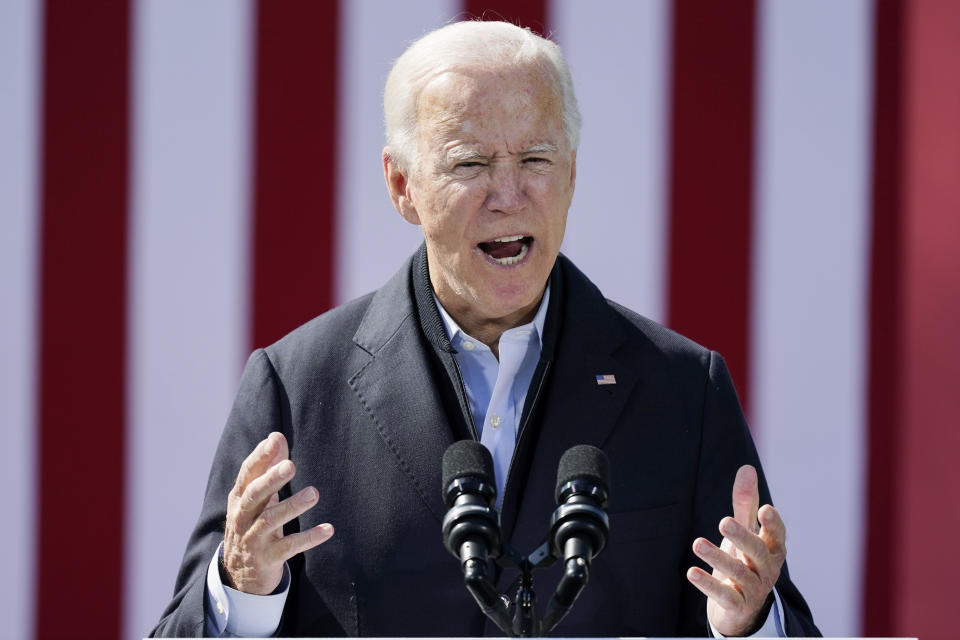Biden is underselling his economic plan
Joe Biden’s tax and spending plan has gotten better.
In March, the Tax Policy Center estimated that the Democratic presidential nominee’s tax plan would raise $4 trillion in revenue over 10 years. Most of that would come from higher taxes on businesses and the wealthy, but workers at every income level would have borne at least small tax increases that cut their take-home pay.
Since then, Biden has tweaked his plan, adding new tax credits for lower earners. The campaign has also signaled it wouldn’t seek to raise taxes right away, on account of the coronavirus recession. In an updated October analysis, the Tax Policy Center found Biden’s revised plan would raise just $2.4 trillion and go easier on the highest earners. And instead of facing modest tax hikes, the bottom 80% of earners would see after-tax income rise, not fall.
You’re more likely to hear about the Biden tax plan from President Trump than from Biden himself, however. Trump routinely claims Biden would raise taxes on most Americans—which is false—while Biden seems more eager to talk about Trump’s record than his own ideas. “The Trump administration has been saying, under Biden, you’ll essentially see an increase in your taxes,” Greg Daco, chief US economist for forecasting firm Oxford Economics, says in the latest episode of the Yahoo Finance Electionomics podcast. “I’m very surprised there hasn’t been more of a push to communicate that in the Biden proposals, there aren’t any taxes in 2021. That’s the fault of the Biden campaign.”
Oxford Economics has analyzed both the Biden and Trump economic plans, and found that Biden’s plan would do more to boost growth and jobs than Trump’s. Biden favors new spending on affordable housing, health care, climate change, infrastructure and child care, and higher taxes on businesses and the wealthy to pay for it. Trump’s economic plan is foggy, consisting mostly of bullet points on the campaign website. But some of Trump’s proposed policies would cut spending and possibly hinder growth, and his promise to cut the payroll tax workers and businesses pay is politically unrealistic.

Several other analyses find that the Biden’s plan would modestly improve growth, including reports by Moody’s Analytics and the Penn Wharton Budget Model. The Tax Foundation finds that Biden’s tax plan would slightly reduce GPD growth, but that analysis doesn’t account for new spending under Biden that would be meant to boost growth.
Biden’s plans, on paper, may not mean a lot if he ends up getting elected. Under a Biden administration, the first order of business would be new stimulus spending to help the struggling economy get to the other side of the coronavirus pandemic. If Democrats take control of the Senate and therefore control both houses of Congress and the White House, they could pass a huge bill totaling more than $2 trillion in early 2021. If Biden wins but Republicans keep the Senate, Biden might have to settle for a much smaller bill of around $500 billion or so.
Biden advisor Jared Bernstein told Yahoo Finance in September that Biden’s top economic priority isn’t a tax or spending plan: It’s getting control of the coronavirus. Biden would mount a much beefier federal response than Trump, to include a massive boost in testing, more authority for federal health agencies and a national mask mandate. Some of that he could do without any legislation from Congress. If stimulus and virus control are Biden’s first-year priorities, it only makes sense that new tax and spending programs would wait until year 2 or 3, when the economy is back on its feet.
The Oxford analysis considers a “Biden lite” economic plan to be more plausible than Biden’s full set of campaign proposals, which would entail up to $7 trillion in new spending. A Biden-lite scenario might include something closer to $3 trillion in new spending over a decade, with $2 trillion in new taxes to pay for most of it. More modest tax hikes could make such a plan more palatable to markets. “The effect on corporate activity would be relatively minimal,” Daco says. “And in the short run, there wouldn’t really be any negative effects through 2021.” Maybe Biden should tell somebody.
Rick Newman is the author of four books, including “Rebounders: How Winners Pivot from Setback to Success.” Follow him on Twitter: @rickjnewman. Confidential tip line: rickjnewman@yahoo.com. Encrypted communication available. Click here to get Rick’s stories by email.
Read more:
Get the latest financial and business news from Yahoo Finance
Follow Yahoo Finance on Twitter, Facebook, Instagram, Flipboard, SmartNews, LinkedIn, YouTube, and reddit.

 Yahoo Finance
Yahoo Finance 
